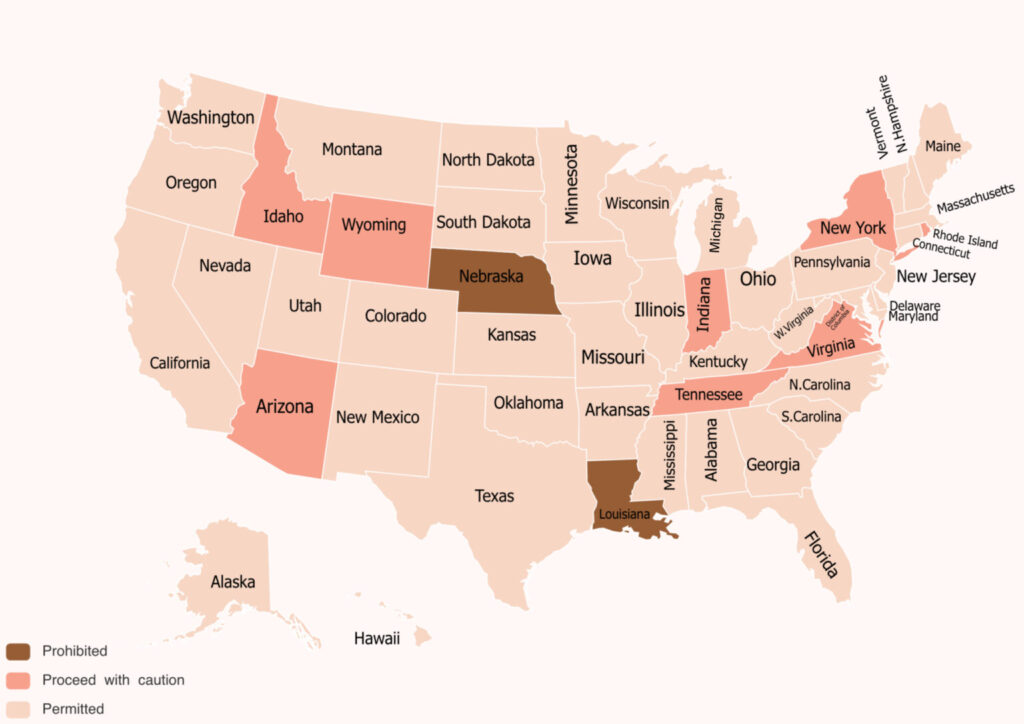Surrogacy can be a life-changing experience, but in the U.S., your rights and protections can look very different depending on where you live. Unlike many areas of family law, surrogacy isn’t governed at the federal level, which means each state decides its own rules. These laws impact everything from compensation to custody, and they’re one of the most important factors to understand before applying to become a surrogate or intended parent.
In this guide, we’ll walk through how surrogacy laws vary across the country and how to move forward safely and legally with support from a knowledgeable agency like Joy of Life®.
Why Surrogacy Laws Vary in the U.S.
Unlike many areas of family law, surrogacy isn’t governed by a single set of federal rules. Instead, each state has the authority to create and enforce its own surrogacy laws, and the results can vary dramatically. In some states, the process is clearly defined and well-supported. In others, it’s limited, risky or not addressed by law at all.
To understand how surrogacy is treated across the U.S., it’s also important to know the difference between two primary types:
- Gestational Surrogacy: This is the most common and legally supported type of surrogacy. The surrogate carries a baby created through in vitro fertilization (IVF) using an egg and sperm from the intended parents or donors, meaning she has no genetic connection to the child.
- Traditional Surrogacy: The surrogate uses her own egg, making her the biological mother. This form is less common and carries more legal complexity, which is why many agencies, including Joy of Life®, focus solely on gestational surrogacy.
Because there’s no national standard, the surrogacy process and legal protection differ depending on where you live.
Key Ways State Laws Impact Surrogacy
State laws don’t just influence whether surrogacy is allowed — they shape every part of the process, from parentage to pay.
Establishing Legal Parentage
In many surrogacy-friendly states, courts grant pre-birth parentage orders, which legally recognize the intended parents before the child is born. This allows for a smooth transition at birth, with their names appearing on the birth certificate and no ambiguity about custody.
In more restrictive or less-defined states, post-birth processes may be required. These can involve court petitions or second-parent adoptions after delivery, which can delay legal recognition and increase emotional and logistical stress for everyone involved.
Compensation and Contract Enforceability
Surrogacy compensation laws vary widely. Some states fully permit base pay and reimbursements for expenses like maternity clothing, travel and lost wages. Others may allow only medical reimbursements — and in a few states, any compensation is illegal.
That’s why a legally enforceable contract is essential. In supportive states, these agreements protect both parties. But in states where surrogacy laws are unclear or hostile, contracts may be unenforceable, leaving surrogates unpaid and intended parents without legal custody.
Requirements To Be a Surrogate
State laws also play a role in determining who’s eligible to become a surrogate. Some requirements are written into law, while others are commonly followed across the industry to support the health, safety and well-being of everyone involved.
Typical surrogacy requirements include:
- Age between 21-42
- BMI under 30
- A history of healthy, full-term pregnancies
- A stable, smoke-free lifestyle
- No more than five total deliveries and two C-sections
- Passing medical, psychological and background screenings
- Living in a state where compensated surrogacy is legal
Legal Risks in States Without Clear Protections
In states where surrogacy laws are vague, outdated or hostile, the stakes are higher. Without legal clarity, intended parents and surrogates may face:
- Void Contracts: Courts may refuse to enforce agreements, leaving surrogates without pay or protection.
- Custody Confusion: Intended parents may need to adopt their own child or risk losing parental rights.
- Legal Penalties: In a few states, compensated surrogacy could result in civil or criminal consequences.

Understanding State-by-State Surrogacy Laws
Surrogacy laws provide critical safeguards for intended parents, surrogates and children. In states with well-defined laws, the surrogacy process is clearer, safer and more secure for all parties. However, the risks can be high in states without clear legal frameworks, making it even more important to understand your state’s laws before moving forward.
Surrogacy-Friendly States
These states have comprehensive laws that explicitly protect gestational surrogacy and recognize the rights of both intended parents and surrogates. They often allow for pre-birth parentage orders and don’t impose restrictions based on marital status or genetic ties.
What they typically offer:
- Clear Legal Path to Parentage: Pre-birth parentage orders are available in surrogacy-friendly states, ensuring intended parents are legally recognized before the child is born.
- Inclusive Rights: These states often accommodate LGBTQ+ individuals and unmarried couples, removing restrictions based on marital status or genetic ties.
- Legal Protections: Compensated surrogacy agreements are enforceable in these states, providing financial protections for surrogates and security for intended parents.

States With Conditional or Restrictive Laws
In these states, surrogacy is legal, but only under specific conditions. These restrictions can complicate the process and add legal hurdles for both surrogates and intended parents.
Typical restrictions may include:
- Marital or Relationship Requirements: Some states limit surrogacy to married couples or heterosexual partnerships.
- Post-Birth Legal Steps: Some states require post-birth adoption or amendments to birth certificates to establish parental rights.
- Genetic Link Requirements: Certain states require intended parents to have a genetic connection to the child for pre-birth orders.
States Where Surrogacy Is Prohibited or Risky
In these states, compensated surrogacy is banned, or contracts are considered void and unenforceable. As a result, entering into a surrogacy agreement could lead to legal consequences or offer little to no legal protection for those involved.
Risks include:
- Unenforceable Contracts: Intended parents may face challenges securing parental rights, while surrogates may not receive agreed-upon compensation.
- No Clear Path to Parentage: Without enforceable pre-birth orders, intended parents may need to pursue lengthy post-birth adoption processes.
States With No Clear Surrogacy Laws
Some states haven’t explicitly addressed surrogacy in their statutes, leaving intended parents and surrogates in legal limbo. In these cases, outcomes can vary depending on the judge, the county or how courts interpret existing family law. This unpredictability makes it essential to work with a knowledgeable agency and legal team that understands how to navigate the gray areas safely and responsibly.

Not sure how your state’s laws impact your surrogacy journey?
Contact us today and get clear, personalized answers from our team.
Why Legal Representation Matters
Because surrogacy laws vary so widely across the U.S., legal representation is essential. What’s allowed in one state may be restricted or even prohibited in another, and those differences can affect everything from who can become an intended parent to how a baby’s parentage is legally recognized.
That’s where experienced legal professionals come in. Attorneys help ensure that every surrogacy journey begins on a strong legal foundation that complies with state laws and protects everyone involved.
At the core of that process is the surrogacy contract, a detailed agreement that outlines expectations and responsibilities for both the surrogate and intended parents. These contracts are drafted and reviewed by two separate attorneys, one for each party, to ensure transparency, fairness and full legal protection.
A well-crafted surrogacy agreement typically includes:
- Compensation and expense coverage
- Medical consent and autonomy
- Legal parentage and custody processes
- Insurance responsibilities
- Contingency plans for rare outcomes
In surrogacy-friendly states, laws may clearly define what needs to be included in a contract and how parental rights are granted. But in states with more restrictive or ambiguous laws, the contract becomes even more important — it’s a safeguard that helps ensure the rights of both parties are respected if complications arise.
At Joy of Life®, we partner with knowledgeable legal professionals who are deeply familiar with state-by-state requirements. We make sure every surrogate and intended parent receives independent legal counsel and that contracts are carefully tailored to meet local legal standards. This approach helps prevent surprises down the road and ensures a smoother, safer experience for everyone involved.
Choosing a Surrogacy Agency
Surrogacy laws can be complicated, which makes choosing the right agency one of the most important decisions you’ll make. A knowledgeable agency will match you with the right surrogate or intended parents and guide you through the legal process with confidence and care.
Look for agencies that are deeply familiar with your state’s laws, especially if you live in an area with restrictions or legal gray zones. They should have experience navigating complex requirements and strong partnerships with legal professionals who specialize in surrogacy.
Before committing, consider asking:
- How do you handle legal complexities in restrictive states?
- What support do you offer throughout the journey?
- Can you share success stories or outcomes in my state?
Joy of Life® has supported hundreds of surrogates and intended parents across the country with a commitment to personalized, state-specific care. Our team includes legal professionals, clinical advisors and dedicated coordinators who walk with you every step of the way, from matching and contracts to delivery and post-birth support.
How to Apply Safely and Legally
Whether you’re considering becoming a surrogate or growing your family through surrogacy, starting the process with legal clarity is essential. Because laws vary so much across the U.S., it’s important to apply through an agency that understands your state’s legal landscape and can guide you accordingly.
Here’s what to look for when applying:
- State Eligibility: Make sure compensated surrogacy is legal in your state and that you meet any location-based requirements.
- Screening and Qualifications: Reputable agencies will require full medical, psychological and background screenings to ensure you’re prepared for the journey ahead.
- Legal Guidance: Surrogacy agreements should always be reviewed by independent attorneys representing both parties to protect everyone’s rights and responsibilities.
The Joy of Life® team ensures every application aligns with state laws and is backed by expert legal and emotional support. From your first inquiry to your final milestone, we’re committed to making the journey safe, clear and rewarding.

Wherever You’re Starting, We’re Here to Help
Surrogacy law can feel overwhelming, but you don’t have to figure it out alone. Whether you’re dreaming of helping a family grow or preparing to build one of your own, Joy of Life is here to guide you through the details.
Apply to become a surrogate or start your intended parent application today.










